be动词与can的用法练习
be动词的用法题20道

be动词的用法题20道一、介绍be动词的用途及基本形式be动词是英语中最常用的动词之一,其主要功能是描述、说明或表示存在。
它有许多不同的形式和用法,包括am、is、are、was、were等等。
在本文中,我们将通过20道练习题来加深对be动词用法的理解和掌握。
二、判断下列句子中be动词的形式是否正确(选择填空题)1. She am a doctor.2. They is from France.3. I were happy to see you.4. He are a talented musician.答案:1. 错误。
正确形式为She is a doctor.2. 错误。
正确形式为They are from France.3. 错误。
正确形式为I was happy to see you.4. 错误。
正确形式为He is a talented musician.三、填空练习:根据句意填入相应的be动词形式1. My friends and I _____ excited about the upcoming trip.2. She ______ an excellent dancer.3. We ________ tired after a long day at work.4. The cat _____ sleeping on the couch.1. are2. is3. are4. is四、翻译练习:将下列句子翻译成英文1. 他们是我的家人。
2. 这个房间很大。
3. 我们正在看一部有趣的电影。
4. 她是我们的老师。
答案:1. They are my family.2. This room is big.3. We are watching an interesting movie.4. She is our teacher.五、改正下列句子中be动词的错误用法1. I is very tired today.2. You am a good singer.3. They was late for the meeting.4. She were happy to receive the gift.1. 改为I am very tired today.2. 改为You are a good singer.3. 改为They were late for the meeting.4. 改为She was happy to receive the gift.六、连词练习:选择正确的形式填空1. She _____ not feeling well, ______ she still went to work.2. Jack _______ nice, _______, sometimes he can be rude.3. _______ you and your sister going to the party?4. We were exhausted, _____ we still managed to finish the project on time.答案:1. was, but2. is, but3. Are4. but七、回答问题练习:根据问题使用be动词给出正确回答1. How old _____ you?2. Where ______ they from?3.What ________ your favorite color?4.What time _____ the concert start?1.am / are / is2.are3.is4.does八、选择填空:选择适当的形式填入括号中1.I _______ a huge fan of Harry Potter books when I was a child.(was/were)2. ______ you feeling better now? (Is/Are)3. We _______ so tired after the long hike.(is/are)4. He _______ unable to attend the meeting due to a family emergency.(was/were)答案:1.was2.Are3.are4.was九、阅读理解:根据短文选择正确的形式填空I (am / is) an English teacher. My students (am / are) very enthusiastic about learning. Last week, we (is / were) discussing the importance of education in our lives.One of my students named Sarah told me that she (am / is) planning on studying abroad next year. She (were / was) worried about being away from her family for such a long time.Another student, Alex, asked me if I (am / was) ever in a similar situation when I was studying in another country. I replied that I indeed (is / was). It (were / was) an amazing experience that helped me grow as a person.答案:I am an English teacher. My students are very enthusiastic about learning.Last week, we were discussing the importance of education in our lives.One of my students named Sarah told me that she is planning on studying abroad next year. She was worried about being away from her family for such a long time.Another student, Alex, asked me if I was ever in a similar situation when I was studying in another country. I replied that I indeed was. It was an amazing experience that helped me grow as a person.十、总结在本文中,我们通过20道题目对be动词的用法进行了练习和梳理。
be动词与情态动词的用法
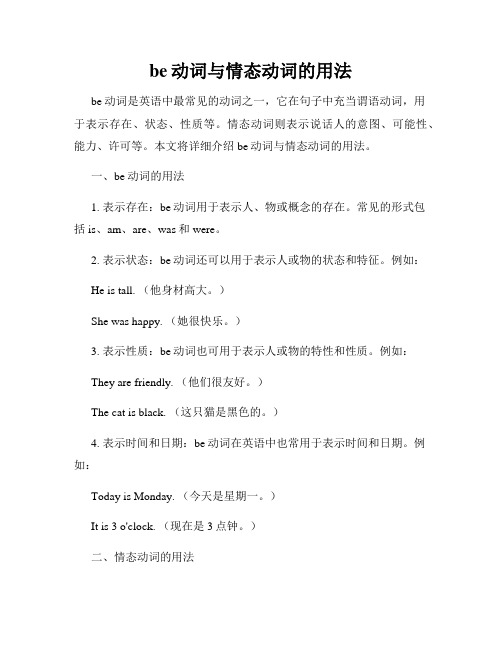
be动词与情态动词的用法be动词是英语中最常见的动词之一,它在句子中充当谓语动词,用于表示存在、状态、性质等。
情态动词则表示说话人的意图、可能性、能力、许可等。
本文将详细介绍be动词与情态动词的用法。
一、be动词的用法1. 表示存在:be动词用于表示人、物或概念的存在。
常见的形式包括is、am、are、was和were。
2. 表示状态:be动词还可以用于表示人或物的状态和特征。
例如:He is tall. (他身材高大。
)She was happy. (她很快乐。
)3. 表示性质:be动词也可用于表示人或物的特性和性质。
例如:They are friendly. (他们很友好。
)The cat is black. (这只猫是黑色的。
)4. 表示时间和日期:be动词在英语中也常用于表示时间和日期。
例如:Today is Monday. (今天是星期一。
)It is 3 o'clock. (现在是3点钟。
)二、情态动词的用法情态动词常用于表示说话人的意图、可能性、能力、许可等。
常见的情态动词包括can、could、may、might、shall、should、will、would、must、ought to等。
1. 表示能力:can和could用于表示某种能力或技能。
例如:I can swim. (我会游泳。
)He could play the piano. (他会弹钢琴。
)2. 表示可能性:may、might和could用于表示某种可能性或推测。
例如:It may rain tomorrow. (明天可能会下雨。
)He might be busy. (他可能很忙。
)3. 表示许可和建议:may、can和could有时用于表示许可或建议。
例如:May I have a piece of cake? (我可以吃一块蛋糕吗?)Can you help me with my homework? (你可以帮我做作业吗?)4. 表示义务和推荐:should和ought to用于表示某种义务或建议。
初一上册be动词,can ,一般现在时的用法归纳

—copula: be (am, is, are)♦ I am …♦ He / She / It is …♦ We / You / They are …♦ 表示询问时将be 动词放到句子开头,否定形式在be 动词后面加not (可以缩写).变化形式归纳如下:♦ 一般来说,be 可以用于下列几种情况: 1. Be+形容词I am very happy. 我很高兴. He is very nice. 他人很好.2. Be+名词They are my friends. 他们是我的朋友.He is a very clever boy. 他是一个非常聪明的男孩.3. Be+介词短语The book is on the desk. 书在桌子上. She is at home now. 她现在在家.Are they from America? 他们是来自美国的吗?4. Be+形容词短语He is only twelve years old. 他只有12岁.5. Be+副词Class is over. 下课了.—modal verb: can♦ 在表达 “某人能做某事” 时,可以用 “can+动词原形” 表达.如果表达自己不能做某事,可以在can后面加not,成为cannot,也可以缩写为can’t.如:I can play football. --- I cannot play football.Dick can speak English. --- Dick can’t speak English.*can是情态动词,没有人称和数的变化.如:They can swim, but he can’t swim.♦如果是询问某人能不能做某事,则要使用can的疑问形式,即将can提至句首.如: --Can you swim? 你会游泳吗?--Yes, I can. / No, I can’t. 是的,我会. / 不,我不会.--Can she speak Chinese? 她会说中文吗?--Yes, she can. / No, she can’t. 是的,她会. / 不,她不会.♦Can的用法和句式可以总结如下:*注: can在这里都表示能力,而且表示的为现在的能力,不能表示过去或将来的能力.—sentence pattern: there be♦there be句型一般用来表示“…地方有…”.句子的结构一般为“there is/are + 某物/人+ 地点”. 如:There is some water in the bottle. 瓶子里有一点水.There are many students in the classroom. 课室里有很多学生.♦there be句型的用法可以总结如下:*否定句和疑问句中some要改为any.注: 某地有某物要用there be来说而不能说there have/has.♦there be句型用来表示某地有某物,如果表示自己有什么东西可以用have got来表示.如:I have got a brother and a sister. 我有一个哥哥和一个姐姐.I have got a very lovely pet. 我有一只很可爱的宠物.♦如果表示“他/她”有,则要用has got, 而“我们, 你(们), 他们”用have got. 如: He has got a basketball. 他有一个篮球.We have got many friends. 我们有很多朋友.♦如果要表示“没有”, 则要用have not (haven’t) got 或者has not (hasn’t) got; 问“有没有”则要把have/has提至句首. 如:You haven’t got a football. 你没有足球.Has he got a brother? 他有兄弟吗?Have they got any fruit? 他们有水果吗?♦have/has got 的变化形式可以总结如下:*注: have got表示“某人有”, 而there be表示“某地有”. 表示某地有某物不能用there have/has的形式.♦有时have got与there be句型表达的意思有些相近,但句型和侧重点还是不同.如: We haven’t got any meat in the fridge. 我们冰箱里没有肉了.There isn’t any meat in the fridge. 冰箱里没有肉了.两句都表示冰箱没有肉的意思.但是第一句首先是说“我们没有肉了”,冰箱是次要的; 而第二句则只是表示冰箱没有肉了,至于其他地方有没有,是不是我们的肉就不得而知了.因此,使用中要注意表达的侧重点.如果到商场买东西,最好用“Have you got any…?”♦some和any既可以用于可数名词的复数之前,也可以用于不可数名词之前. some用于肯定句,any用于否定句和疑问句. 如:There is some milk in the cup. 杯子里有一些牛奶.There are some students in the classroom. 课室里有一些学生.I have got some good friends. 我有一些好朋友.Have you got a bike? 你有单车吗?I haven’t got any water. 我没有水了.Have they got any apples? 他们有苹果吗?♦Some用在可数名词前的时候名词要用复数形式.名词的复数变化如下:*一些名词的复数形式有不规则变化,如:man—men woman—women child—children foot—feet tooth—teeth*有些名词的单复数同形, 如: deer, sheep, Chinese, Japanese等.*名词除了可数名词以外,还有不可数名词.常见的不可数名词有:1.物质名词: milk, water, meat, juice, rice, wheat, money2.抽象名词: beauty, youth, health, strength*不可数名词前面不可以用表示具体数量的数词或不定冠词.常见的用于不可数名词钱的词或短语有: some, any, much, a lot of等.—Modal verb: would♦Would you like to…?一般可以用来邀请对方做某事。
be动词、助动词、情态动词用法总结及练习
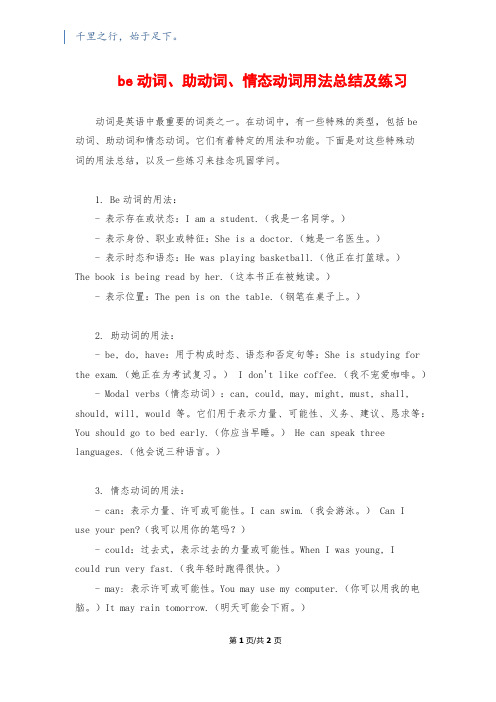
千里之行,始于足下。
be动词、助动词、情态动词用法总结及练习动词是英语中最重要的词类之一。
在动词中,有一些特殊的类型,包括be动词、助动词和情态动词。
它们有着特定的用法和功能。
下面是对这些特殊动词的用法总结,以及一些练习来挂念巩固学问。
1. Be动词的用法:- 表示存在或状态:I am a student.(我是一名同学。
)- 表示身份、职业或特征:She is a doctor.(她是一名医生。
)- 表示时态和语态:He was playing basketball.(他正在打篮球。
)The book is being read by her.(这本书正在被她读。
)- 表示位置:The pen is on the table.(钢笔在桌子上。
)2. 助动词的用法:- be, do, have:用于构成时态、语态和否定句等:She is studying for the exam.(她正在为考试复习。
) I don't like coffee.(我不宠爱咖啡。
)- Modal verbs(情态动词):can, could, may, might, must, shall, should, will, would等。
它们用于表示力量、可能性、义务、建议、恳求等:You should go to bed early.(你应当早睡。
) He can speak three languages.(他会说三种语言。
)3. 情态动词的用法:- can:表示力量、许可或可能性。
I can swim.(我会游泳。
) Can Iuse your pen?(我可以用你的笔吗?)- could:过去式,表示过去的力量或可能性。
When I was young, Icould run very fast.(我年轻时跑得很快。
)- may: 表示许可或可能性。
You may use my computer.(你可以用我的电脑。
can,be动词,名词变复数,三单用法
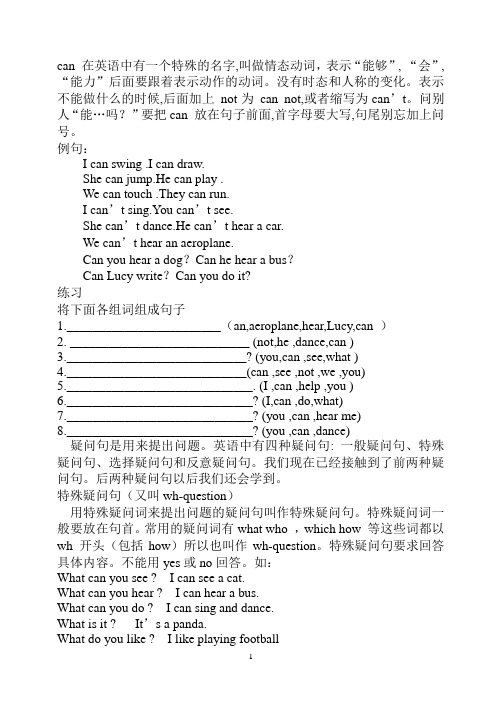
can 在英语中有一个特殊的名字,叫做情态动词,表示“能够”, “会”, “能力”后面要跟着表示动作的动词。
没有时态和人称的变化。
表示不能做什么的时候,后面加上not为can not,或者缩写为can’t。
问别人“能…吗?”要把can 放在句子前面,首字母要大写,句尾别忘加上问号。
例句:I can swing .I can draw.She can jump.He can play .We can touch .They can run.I can’t sing.You can’t see.She can’t dance.He can’t hear a car.We can’t hear an aeroplane.Can you hear a dog?Can he hear a bus?Can Lucy write?Can you do it?练习将下面各组词组成句子1.________________________(an,aeroplane,hear,Lucy,can )2. ____________________________ (not,he ,dance,can )3.____________________________? (you,can ,see,what )4.____________________________(can ,see ,not ,we ,you)5._____________________________. (I ,can ,help ,you )6._____________________________? (I,can ,do,what)7._____________________________? (you ,can ,hear me)8._____________________________? (you ,can ,dance)疑问句是用来提出问题。
助动词用法及练习
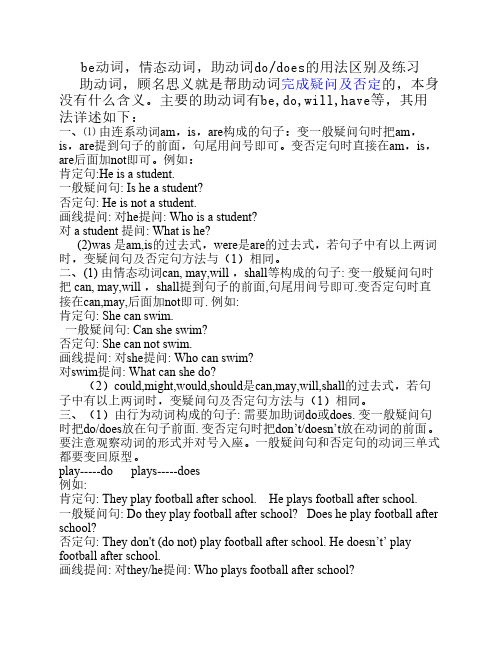
be动词,情态动词,助动词do/does的用法区别及练习助动词,顾名思义就是帮助动词完成疑问及否定的,本身没有什么含义。
主要的助动词有be,do,will,have等,其用法详述如下:一、⑴由连系动词am,is,are构成的句子:变一般疑问句时把am,is,are提到句子的前面,句尾用问号即可。
变否定句时直接在am,is,are后面加not即可。
例如:肯定句:He is a student.一般疑问句: Is he a student?否定句: He is not a student.画线提问: 对he提问: Who is a student?对 a student 提问: What is he?(2)was 是am,is的过去式,were是are的过去式,若句子中有以上两词时,变疑问句及否定句方法与(1)相同。
二、(1) 由情态动词can, may,will ,shall等构成的句子: 变一般疑问句时把 can, may,will ,shall提到句子的前面,句尾用问号即可.变否定句时直接在can,may,后面加not即可. 例如:肯定句: She can swim.一般疑问句: Can she swim?否定句: She can not swim.画线提问: 对she提问: Who can swim?对swim提问: What can she do?(2)could,might,would,should是can,may,will,shall的过去式,若句子中有以上两词时,变疑问句及否定句方法与(1)相同。
三、(1)由行为动词构成的句子: 需要加助词do或does. 变一般疑问句时把do/does放在句子前面. 变否定句时把don’t/doesn’t放在动词的前面。
要注意观察动词的形式并对号入座。
一般疑问句和否定句的动词三单式都要变回原型。
play-----do plays-----does例如:肯定句: They play football after school. He plays football after school.一般疑问句: Do they play football after school? Does he play football after school?否定句: They don't (do not) play football after school. He doesn’t’ play football after school.画线提问: 对they/he提问: Who plays football after school?对play football提问: What do they do after school? What does he do after school?对after school提问: When do they play football? When does he play football?(2)did是do和did的过去式,变一般疑问句时把did放在句子前面.变否定句时把didn’t放在动词的前面, 要注意观察动词的形式并对号入座。
be动词和实义动词练习
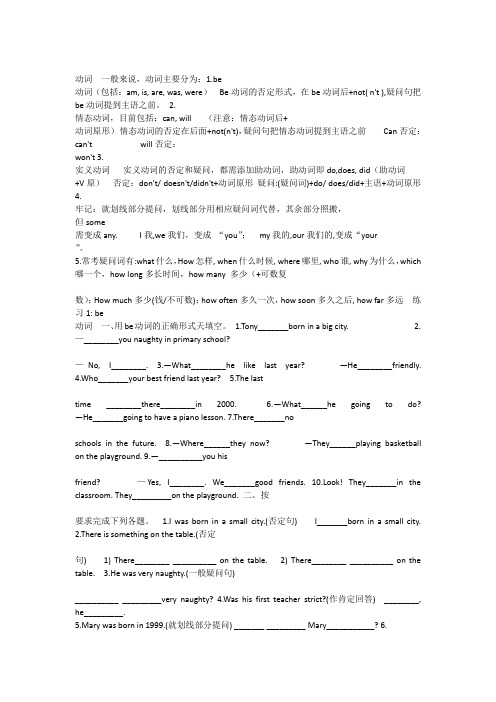
动词一般来说,动词主要分为:1.be动词(包括:am, is, are, was, were)Be动词的否定形式,在be动词后+not( n't ),疑问句把be动词提到主语之前。
2.情态动词,目前包括:can, will (注意:情态动词后+动词原形)情态动词的否定在后面+not(n't),疑问句把情态动词提到主语之前Can否定:can't will否定:won't 3.实义动词实义动词的否定和疑问,都需添加助动词,助动词即do,does, did(助动词+V原)否定:don't/ doesn't/didn't+动词原形疑问:(疑问词)+do/ does/did+主语+动词原形4.牢记:就划线部分提问,划线部分用相应疑问词代替,其余部分照搬,但some需变成any. I我,we我们,变成“you”;my我的,our我们的,变成“your”。
5.常考疑问词有:what什么,How怎样, when什么时候, where哪里, who谁, why为什么,which 哪一个,how long多长时间,how many 多少(+可数复数);How much多少(钱/不可数);how often多久一次,how soon多久之后, how far多远练习1: be动词一、用be动词的正确形式天填空。
1.Tony_______born in a big city. 2.—________you naughty in primary school?—No, I________. 3.—What________he like last year? —He________friendly.4.Who_______your best friend last year?5.The lasttime ________there________in 2000. 6.—What______he going to do? —He_______going to have a piano lesson. 7.There_______noschools in the future. 8.—Where______they now? —They______playing basketball on the playground. 9.—__________you hisfriend? —Yes, I________. We_______good friends. 10.Look! They_______in the classroom. They_________on the playground. 二、按要求完成下列各题。
be动词、助动词、情态动词用法总结及练习(答案)

助动词do/does
什么是助动词?
顾名思义,助动词就是帮助动词的,而本身没有 实际意义的动词,是具有雷锋精神的词汇。
助动词do的三种变化形式
do 第三人称单数时使用的does 过去式did
do的基本用法:
1 构成否定句 2 构成一般疑问句及回答 3 构成特殊疑问句
do的各种形式
肯定式:do 否定式:don't/do not do用在第一人称单复数、第二人称单复数和第三人称复 数作主语,且时态为一般现在时的句子,如:
4. shall的用法
1)shall常用于第一人称,表示简单的将来,构成将来时态。(助词)
ex: I shall think it over and let you know my idea.
When shall we meet again?
We shall have a good time in the park. 2) shall用于第一人称,还可以表示征求对方的意愿。
ex: My brother is ill, so I have to call the doctor in the middle of the night. 2) have to有人称、时态和单复数上的变化,而must只有一种形式。
have to → had to I have to/she has to
shall和will的对比
1)shall和will作为助动词可以与动词原形一起构成将来时。如: I shall study harder at English. 我将更加努力学习英语。 He will go to Shanghai. 他要去上海。
2)以前的语法中,shall用于第一人称,will只用于第二、第三人称。现在,尤其 是在口语中,will常用于第一人称,但shall只用于第一人称,如果用于第二、第三 人称,就不再有“将要”的意义,就变成命令、警告或威胁的意思了。
- 1、下载文档前请自行甄别文档内容的完整性,平台不提供额外的编辑、内容补充、找答案等附加服务。
- 2、"仅部分预览"的文档,不可在线预览部分如存在完整性等问题,可反馈申请退款(可完整预览的文档不适用该条件!)。
- 3、如文档侵犯您的权益,请联系客服反馈,我们会尽快为您处理(人工客服工作时间:9:00-18:30)。
姓名:________________ 班级:______________Be动词练习题Be动词的用法口诀:我用am,你用are,is连着他,她,它;单数名词用is,复数名词全用are。
变疑问,往前提,句末问号莫丢弃。
变否定,更容易,be后not莫忘记。
疑问否定任你变,句首大写莫迟疑。
一.用be动词适当的词填空。
1. I ________ from Australia.2. She _______ a student.3.Jane and Tom _________ my friends.4. My parents _______ very busy every day. 6.I ______ an English teacher now. 7.Where _________ you from?10.The light _________ green. 11.My name is _________ Li Dong.I _________ twelve.12._________ they your new friends?13. I ______ a boy. ______ you a boy? No, I _____ not.14. The girl______ Jack's sister. 15. The dog _______ tall and fat.16. ______ your brother in the classroom?17. Where _____ your mother? She ______ at home.18. Whose dress ______ this? 19.That ______ my red skirt.20.Who ______ I? 21. Some tea ______ in the glass.22.Gao shan's shirt _______ over there. 23. My sister's name ______Nancy.24. This ______ not Wang Fang's pencil.25. ______ David and Helen from England?26. We ____ friends. 27. She ___ a teacher.28. I ___ a girl. 29. Many ants ____ in my house.30.His mother ____ fat. 31.He _____ in Class 4, Grade 1.32.What _____ your name? 33. These _____ buses.34. What class _____ you in? 35.It_____ a car.36.Helen____ a student 37.This _____my book.38.My father______a cook. 39.Jack’s friend____in Class One.40.You ____ a doctor. 41. They ____ cars.42.That______her dog. 43.The cat_______on the desk.44.The books_______under the table.二.选择1.She ______ Miss Hen. A.be B.am C.is2.I ______ sorry. A./ B.am C.are3.Here ______ my ball. A.is B.are C.am4.You ______ number eight. A.are B.is C.am5.What_______this? A.is B.are C.be6.Helen____ a student. A.be B.am C.is7.Those _____oranges. A.is B.are C.am8. How old _____your teacher? A.be B.am C.is9. Where __ ___ her mother? A.are B.is C.am10.The two cups of milk _____ for me. A.is B.are C.be11. Eric and Kathy ____ my students. A.are B.is C.am12. Your books ____ not good. A.is B.are C.be13. He ___ a boy. A.be B.am C.is14. It ___ my dog. A.is B.are C.be15.Whose socks ______ they? A.are B.is C.am16. _______ there any chairs in the classroom .A.Is B.Are C.Am17 .The man with big eyes _______ a teacher. A.be B.am C.is18.How _______ your father? A.is B.are C.be19.Mike and Liu Tao ______ at school. A.are B.is C.am20.I _____ a student. A.be B.am C.is21. They ______ teachers. A.is B.are C.be22.This_____my mother. A.are B.is C.am23._____ you a student? Yes,I am. A.Am B.Is C.Are24.The jam _____ good for my grandma. A.is B.are C.be三.写出下列词适当形式:1.I am (缩略形式) ______2.is (复数)______3.we are (缩略形式) ______4.are not(缩略形式) ______5.is not (缩略形式) ______6.can not(缩略形式) ______7.she's(完整形式) ______ 8.it's(完整形式) ______9.they're(完整形式) ______ 10.don't(完整形式) ______三. 将下列句子变成否定句和一般疑问句1.His brother is a teacher.否定句: 一般疑问句:2.Those are his parents.否定句: 一般疑问句:3.I’m 14 years old.否定句: 一般疑问句:4.The ruler is on the table.否定句: 一般疑问句:5.Tom is my teacher .否定句: 一般疑问句:6.My shoes are 20 yuan .否定句: 一般疑问句:7.This is a pen .否定句: 一般疑问句:8.My name is Andy.否定句: 一般疑问句:9.We are twins.否定句: 一般疑问句:10.He is my brother.否定句: 一般疑问句:11.I am a teacher.否定句: 一般疑问句:12.She is my mother.否定句: 一般疑问句:13.This is Miss Zhao.否定句: 一般疑问句:14.She is a new student.否定句: 一般疑问句:15.Tom is my best friend.否定句: 一般疑问句:一、根据提示完整回答问题。
(完整回答)1.Can the Robot sweep the floor? (写两种答案)2.Can your brother do housework? (写两种答案)3.What can you do? (说英语和用英语写字)4.What can your sister do? (使用计算机和维修电脑)二、根据答句写问句。
1. ________________________________________? Yes, I can do the dishes.2. ________________________________________? Yes, we can drive a car.3. ________________________________________? Yes, he can make the bed.4. ________________________________________? Yes, Tom can wash the clothes.5 ._______________________________________? Yes, Amy can water the flowers.6. ________________________________________? No, they can clean the bedroom.7. _______________________________________? I can cook the meals.8. _______________________________________? We can play football.9. _______________________________________? Tom can use a computer.10. ______________________________________? Sarah can sweep the floor.11. ______________________________________? My father can wash the car.12. ______________________________________? My mother can sing and dance.三、短文填空。
(用所给的单词填空,使短文完整,每格一词)( empty, friend, helpful, strict, use, teacher, violin, wash, Amy, home, sing, active )I have a new ______________. She’s __________ . She’s__________. She can __________ many English songs, _________ a computer and play the ____________. She’s also a good child at _____________. She can ___________ the trash and _____________ the clothes for her mother. She’s very ________________.四、补全对话。
